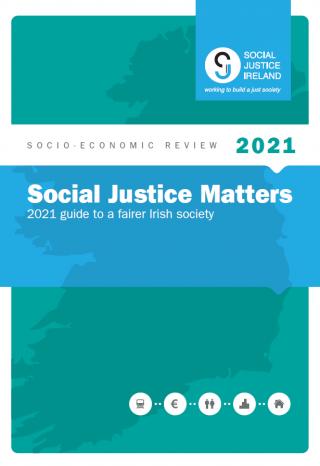Returning to previous ‘normal’ would mean failure – time for a new Social Contract

Covid-19 has exposed and exacerbated weaknesses that already existed in Irish society: a totally inadequate supply of social housing; a two-tier healthcare system; climate change; growing inequality; homelessness; environmental goals not being met, to name but a few. But the past twelve months has shown us that change is possible. In responding to Covid-19, Government made the changes required to protect both society and the economy. Changes, some of which were dramatic, were delivered. The common good featured prominently in planning and delivery. The State, the only institution with the required capacity to address the pandemic, expanded to meet the challenge. This is in stark contrast to the approach taken after 2008. Yes, mistakes were made. But lessons were learned; protecting jobs, services and a minimum standard of living were priorities. Now is the time to build on this progress.
A new Social Contract
In ‘Social Justice Matters: 2021 Guide to a fairer Ireland’, Social Justice Ireland sets out the ‘why’ and the ‘what’ of a new Social Contract. A return to the pre-Covid-19 ‘normal’ would be a pathway to continued failure. Building a better future is meaningless unless ‘better’ means fairer, more just and, therefore, more equal. A new Social Contract is required to address existing weaknesses and meet future challenges. The framework for a new Social Contract should focus on delivering five key outcomes: (1) a thriving economy, (2) decent infrastructure and services, (3) just taxation, (4) good governance and (5) environmental, social and economic sustainability. Such a framework would deliver a fair recovery and improve the quality of life for all.
A new Social Contract would view public services as investments rather than liabilities, look for ways to make labour markets less insecure, redesign redistribution for the modern world and really tackle the problems of inequality. COVID-19 has demonstrated that our public services and social welfare supports are essential assets when faced with an unprecedented crisis.
A bigger public sector
Ireland will emerge from the pandemic with a larger public sector. We must ensure that everyone benefits from this, and that these much needed services and infrastructure are adequately resourced going forward. Decades of weakening the public sector have been exposed by the pandemic. The failure of successive Governments to address inequality, for example, has led to the persistence of poverty which means a lack of adequate income, accommodation, healthcare, food, job security and education. This goes beyond mere income inequality.
The design and implementation of our recovery after the Covid-19 crisis will reshape our society and economy for future generations. It is important that we get these decisions right. Ireland’s economic growth in recent years has been spread very unevenly; we can reverse this trend, and improve our wellbeing and living standards if we take this opportunity to implement real change. As Ireland moves into a post-Covid world, it needs to cure the virus of social injustice, inequality, marginalisation and environmental destruction. In its place it needs a new Social Contract. A new Social Contract is not simply do-able; it is also desirable, effective and efficient. It’s time for change.
Social Contract proposals
- In order to deliver affordable and appropriate accommodation for example and put an end to our market driven dysfunctional housing system, Government should introduce a social housing target of 20 per cent of all housing by the year 2030 (up from 9 per cent at present).
- To truly address the challenges of inequality Government should set a minimum social floor of income and services below which nobody in society should fall.
- To address labour market challenges of low pay, under-employment and the employment impacts of COVID-19, Government should resource integrated training and labour market programmes and launch a major investment programme. Particular attention must be paid to the problem of youth unemployment.
- Additional resources in our healthcare system must be deployed in a way which delivers the transformation of the health service in line with Sláintecare. This requires increasing the availability and quality of Primary Care and Social Care services and the full roll-out of the Community Health Networks (CHNs). Government must also institute long-term planning and investment in the sector in order to meet the impending demographic changes.
- In order to begin to address the impact of lost learning on students at all levels in the past twelve months increased resources and reduced class sizes are required. In order to mitigate the impact on those most vulnerable, Government must make the improvement of educational outcomes for pupils from disadvantaged backgrounds and disadvantaged communities a policy priority.
- To promote the sustainability agenda and meet our climate targets in a fair way we need a new National Index of Progress encompassing environmental and social indicators of progress as well as economic ones. We need a comprehensive mitigation and transition programme to support communities and individuals in the transition to a low carbon society together with a Just Transition Dialogue structure at regional and national level.
- In order to ensure that rural Ireland is not left behind as we deal with the impact of COVID-19, Brexit, climate change and the digital transition, investment in services and infrastructure in the regions must be prioritised. High speed broadband, an integrated, accessible and flexible rural transport network and integrated supports for rural entrepreneurs, micro-enterprises and SMEs are a must.